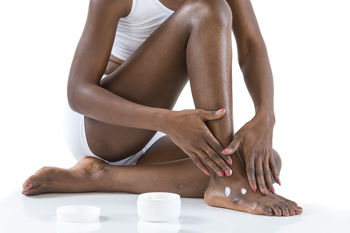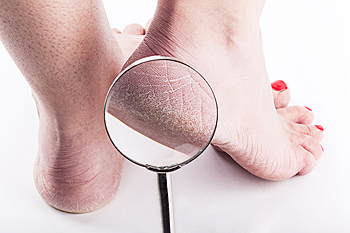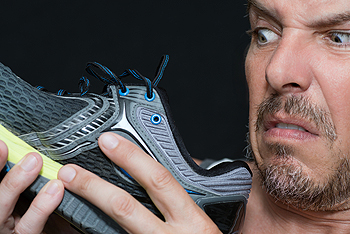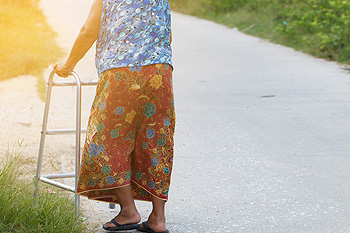Copyright © Michigan Foot and Ankle | Site Map | Nondiscrimination Policy | Design by: Podiatry Content Connection
February 2019
Taking Care of Your Feet
 Feet go through a lot of wear and tear over the course of one’s life, so it's important to take small steps to ensure their overall health. Wearing comfortable shoes is key when trying to keep your feet healthy. Shoes that are tight or lack support can lead to various types of uncomfortable foot conditions. Some of these conditions include bunions, Morton’s neuroma, ingrown toenails, and blisters. Daily walking routines help keep the muscles in your feet active, flexible, and strong, which could prevent fallen arches or other complications later on in life. Most of the time, feet spend majority of the day confined to a shoe, which can trap moisture and bacteria. Cleaning your feet daily and wearing socks helps to prevent bacterial and fungal infections. Moisturizing your feet also contributes to their health by preventing dry, cracked, or scaly skin. If you would like any additional information on how to care for your feet, then it is suggested you speak with a podiatrist.
Feet go through a lot of wear and tear over the course of one’s life, so it's important to take small steps to ensure their overall health. Wearing comfortable shoes is key when trying to keep your feet healthy. Shoes that are tight or lack support can lead to various types of uncomfortable foot conditions. Some of these conditions include bunions, Morton’s neuroma, ingrown toenails, and blisters. Daily walking routines help keep the muscles in your feet active, flexible, and strong, which could prevent fallen arches or other complications later on in life. Most of the time, feet spend majority of the day confined to a shoe, which can trap moisture and bacteria. Cleaning your feet daily and wearing socks helps to prevent bacterial and fungal infections. Moisturizing your feet also contributes to their health by preventing dry, cracked, or scaly skin. If you would like any additional information on how to care for your feet, then it is suggested you speak with a podiatrist.
Everyday foot care is very important to prevent infection and other foot ailments. If you need your feet checked, contact one of our podiatrists from Michigan Foot and Ankle. Our doctors can provide the care you need to keep you pain-free and on your feet.
Everyday Foot Care
Often, people take care of their bodies, face and hair more so than they do for their feet. But the feet are a very important aspect of our bodies, and one that we should pay more attention to. Without our feet, we would not be able to perform most daily tasks.
It is best to check your feet regularly to make sure there are no new bruises or cuts that you may not have noticed before. For dry feet, moisturizer can easily be a remedy and can be applied as often as necessary to the affected areas. Wearing shoes that fit well can also help you maintain good foot health, as well as making it easier to walk and do daily activities without the stress or pain of ill-fitting shoes, high heels, or even flip flops. Wearing clean socks with closed shoes is important to ensure that sweat and bacteria do not accumulate within the shoe. Clean socks help to prevent Athlete’s foot, fungi problems, bad odors, and can absorb sweat.
If you have any questions please feel free to contact one of our offices located in Ferndale, and Milford, MI . We offer the newest diagnostic and treatment technologies for all your foot and ankle needs.
What Causes Cracked Heels?
 The uncomfortable condition known as cracked heels may develop for a variety of reasons.These may include standing for extended periods of time, wearing shoes that have an open back, or existing medical conditions such as eczema or psoriasis. The noticeable symptoms of cracked heels often include thickened skin in the heel area, and cracks, or fissures appearing at the end of the heel. Pain and discomfort are often associated with this condition, and mild relief may be obtained by washing and drying the feet frequently, followed by utilizing a good moisturizer. If the fissures should become deep, it is suggested that you seek the counsel of a podiatrist who can properly diagnosis and treat this condition.
The uncomfortable condition known as cracked heels may develop for a variety of reasons.These may include standing for extended periods of time, wearing shoes that have an open back, or existing medical conditions such as eczema or psoriasis. The noticeable symptoms of cracked heels often include thickened skin in the heel area, and cracks, or fissures appearing at the end of the heel. Pain and discomfort are often associated with this condition, and mild relief may be obtained by washing and drying the feet frequently, followed by utilizing a good moisturizer. If the fissures should become deep, it is suggested that you seek the counsel of a podiatrist who can properly diagnosis and treat this condition.
If the skin on your feet starts to crack, you may want to see a podiatrist to find treatment. If you have any concerns, contact one of our podiatrists from Michigan Foot and Ankle. Our doctors can provide the care you need to keep you pain-free and on your feet.
Cracked Heels
It is important to moisturize your cracked heels in order to prevent pain, bleeding, and infection. The reason cracked heels form is because the skin on the foot is too dry to support the immense pressure placed on them. When the foot expands, the dry skin on the foot begins to split.
Ways to Help Heal Them
- Invest in a good foot cream
- Try Using Petroleum Jelly
- Ease up on Soaps
- Drink Plenty of Water
Ways to Prevent Cracked Heels
- Moisturize After Showering
- Skip a Shower
- Keep Shower Water Lukewarm
- Don’t Scrub Your Feet
If you are unsure how to proceed in treating cracked heels, seek guidance from a podiatrist. Your doctor will help you with any questions or information you may need.
If you have any questions, please feel free to contact one of our offices located in Ferndale, and Milford, MI . We offer the newest diagnostic and treatment technologies for all your foot care needs.
Causes of Plantar Hyperhidrosis
 Many people experience excessive sweating on the soles of their feet, and this is referred to as plantar hyperhidrosis. This condition may be a result of overactive sweat glands, and may be triggered by hot weather, eating spicy food, or exercising for extended periods of time. Additionally, there may be existing medical conditions which may contribute to causing this condition, including peripheral or spinal nerve damage, anxiety disorders, or obesity. There are several symptoms that may be noticeable in plantar hyperhidrosis, and these may include an unpleasant odor coming from the soles of the feet, athlete’s foot, or chronic blistering. There may be measures that can be taken to feel more comfortable, and this can be done by changing the shoes when they becomes damp, or replacing absorbent insoles frequently. If you are suffering from this foot condition, it is advised to speak to a podiatrist who can properly diagnose and treat plantar hyperhidrosis.
Many people experience excessive sweating on the soles of their feet, and this is referred to as plantar hyperhidrosis. This condition may be a result of overactive sweat glands, and may be triggered by hot weather, eating spicy food, or exercising for extended periods of time. Additionally, there may be existing medical conditions which may contribute to causing this condition, including peripheral or spinal nerve damage, anxiety disorders, or obesity. There are several symptoms that may be noticeable in plantar hyperhidrosis, and these may include an unpleasant odor coming from the soles of the feet, athlete’s foot, or chronic blistering. There may be measures that can be taken to feel more comfortable, and this can be done by changing the shoes when they becomes damp, or replacing absorbent insoles frequently. If you are suffering from this foot condition, it is advised to speak to a podiatrist who can properly diagnose and treat plantar hyperhidrosis.
If you are suffering from hyperhidrosis contact one of our podiatrists of Michigan Foot and Ankle. Our doctors can provide the care you need to attend to all of your foot and ankle needs.
Hyperhidrosis of the Feet
Hyperhidrosis is a rare disorder that can cause people to have excessive sweating of their feet. This can usually occur all on its own without rigorous activity involved. People who suffer from hyperhidrosis may also experience sweaty palms.
Although it is said that sweating is a healthy process meant to cool down the body temperature and to maintain a proper internal temperature, hyperhidrosis may prove to be a huge hindrance on a person’s everyday life.
Plantar hyperhidrosis is considered to be the main form of hyperhidrosis. Secondary hyperhidrosis can refer to sweating that occurs in areas other than the feet or hands and armpits. Often this may be a sign of it being related to another medical condition such as menopause, hyperthyroidism and even Parkinson’s disease.
In order to alleviate this condition, it is important to see your doctor so that they may prescribe the necessary medications so that you can begin to live a normal life again. If this is left untreated, it is said that it will persist throughout an individual’s life.
A last resort approach would be surgery, but it is best to speak with your doctor to find out what may be the best treatment for you.
If you have any questions please feel free to contact one of our offices located in Ferndale, and Milford, MI . We offer the newest diagnostic and treatment technologies for all your foot and ankle needs.
Methods That May Aid in Falls Prevention
 Research has shown that 33% of elderly people will fall this year, and many are reluctant to discuss it with their physicians. It’s important to take measures which can possibly prevent falling, and this may be beneficial in avoiding painful fractures. Additionally, after a fall has occurred, many seniors may not be willing to perform certain activities, and this may possibly be a result of a fear of falling that has developed. When specific measures are implemented, the risk of falling may be diminished. These may include removing any clutter that may be present in the home, installing grab bars in the shower and bathroom area, and removing any loose carpeting. Additionally, having proper lighting may aid in the prevention of falls. If you have fallen and have injured your feet or ankles, please speak to a podiatrist who can determine what the best course of treatment is for you.
Research has shown that 33% of elderly people will fall this year, and many are reluctant to discuss it with their physicians. It’s important to take measures which can possibly prevent falling, and this may be beneficial in avoiding painful fractures. Additionally, after a fall has occurred, many seniors may not be willing to perform certain activities, and this may possibly be a result of a fear of falling that has developed. When specific measures are implemented, the risk of falling may be diminished. These may include removing any clutter that may be present in the home, installing grab bars in the shower and bathroom area, and removing any loose carpeting. Additionally, having proper lighting may aid in the prevention of falls. If you have fallen and have injured your feet or ankles, please speak to a podiatrist who can determine what the best course of treatment is for you.
Preventing falls among the elderly is very important. If you are older and have fallen or fear that you are prone to falling, consult with one of our podiatrists from Michigan Foot and Ankle. Our doctors will assess your condition and provide you with quality advice and care.
Every 11 seconds, an elderly American is being treated in an emergency room for a fall related injury. Falls are the leading cause of head and hip injuries for those 65 and older. Due to decreases in strength, balance, senses, and lack of awareness, elderly persons are very susceptible to falling. Thankfully, there are a number of things older persons can do to prevent falls.
How to Prevent Falls
Some effective methods that older persons can do to prevent falls include:
- Enrolling in strength and balance exercise program to increase balance and strength
- Periodically having your sight and hearing checked
- Discuss any medications you have with a doctor to see if it increases the risk of falling
- Clearing the house of falling hazards and installing devices like grab bars and railings
- Utilizing a walker or cane
- Wearing shoes that provide good support and cushioning
- Talking to family members about falling and increasing awareness
Falling can be a traumatic and embarrassing experience for elderly persons; this can make them less willing to leave the house, and less willing to talk to someone about their fears of falling. Doing such things, however, will increase the likelihood of tripping or losing one’s balance. Knowing the causes of falling and how to prevent them is the best way to mitigate the risk of serious injury.
If you have any questions, please feel free to contact one of our offices located in Ferndale, and Milford, MI . We offer the newest diagnostic and treatment technologies for all your foot care needs.
Blog Archives
- April 2025
- March 2025
- February 2025
- January 2025
- December 2024
- November 2024
- October 2024
- September 2024
- August 2024
- July 2024
- June 2024
- May 2024
- April 2024
- March 2024
- February 2024
- January 2024
- December 2023
- November 2023
- October 2023
- September 2023
- August 2023
- July 2023
- June 2023
- May 2023
- April 2023
- March 2023
- February 2023
- January 2023
- December 2022
- November 2022
- October 2022
- September 2022
- August 2022
- July 2022
- June 2022
- May 2022
- April 2022
- March 2022
- February 2022
- January 2022
- December 2021
- November 2021
- October 2021
- September 2021
- August 2021
- July 2021
- June 2021
- May 2021
- April 2021
- March 2021
- February 2021
- January 2021
- December 2020
- November 2020
- October 2020
- September 2020
- August 2020
- July 2020
- June 2020
- May 2020
- April 2020
- March 2020
- February 2020
- January 2020
- December 2019
- November 2019
- October 2019
- September 2019
- August 2019
- July 2019
- June 2019
- May 2019
- April 2019
- March 2019
- February 2019
- January 2019
- December 2018
- November 2018
- October 2018
- September 2018
- August 2018
- July 2018
- June 2018
- May 2018
- April 2018
- March 2018
- February 2018
- January 2018
- December 2017
- November 2017
- October 2017
- September 2017
- August 2017
- July 2017
- June 2017
- May 2017
- April 2017
- March 2017
- February 2017
- January 2017





